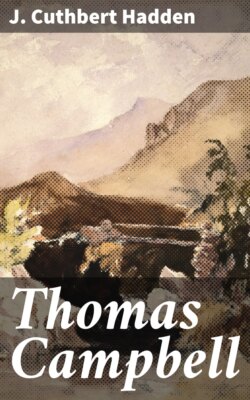Thomas Campbell

Реклама. ООО «ЛитРес», ИНН: 7719571260.
Оглавление
J. Cuthbert Hadden. Thomas Campbell
Thomas Campbell
Table of Contents
PREFACE
THOMAS CAMPBELL
CHAPTER I. ANCESTRY—BIRTH—SCHOOLDAYS
CHAPTER II. COLLEGE AND HIGHLAND TUTORSHIPS
CHAPTER III ‘THE PLEASURES OF HOPE’
CHAPTER IV. CONTINENTAL TRAVELS
CHAPTER V. WANDERINGS—MARRIAGE—SETTLEMENT IN LONDON
CHAPTER VI. POETICAL WORK AND PROSE BOOKMAKING
CHAPTER VII. LECTURES AND TRAVELS
CHAPTER VIII. CLOSING YEARS
CHAPTER IX. PERSONAL CHARACTERISTICS AND PLACE AS A POET
FOOTNOTES
INDEX
OPINIONS OF THE PRESS ON THE “FAMOUS SCOTS” SERIES
Отрывок из книги
J. Cuthbert Hadden
Published by Good Press, 2019
.....
The list of professors in 1791, when Campbell entered, did not include any name of outstanding note. His father’s old friend, Dr. Reid, now a veteran of eighty-one, had retired, though he was still living in the Professors’ Court, and had been succeeded by Professor Arthur, a scholar of respectable ability and varied acquirements, for whom Campbell expressed a sincere admiration. The Greek class was taught by Professor Young, a character of the Christopher North and John Stuart Blackie type, ‘a strangely beautiful and radiant figure in the then grave and solemn group of Glasgow professors.’ William Richardson filled the Humanity—in other words the Latin—Chair, and filled it with some distinction too, in his curled wig, lace ruffles, knee breeches and silk stockings. Richardson was not of those who combine plain living with high thinking. Dining out was his passion. It is told of him that one evening, when the turtle soup was unusually fine, he exclaimed, after repeated helpings, ‘I know there is gout in every spoonful, but I can’t resist it.’ For all this, he was a good scholar and an expert teacher, enjoying some repute as one of Mackenzie’s coadjutors in The Mirror; a poet, too, and the author of one or two books which were read in their day. The Logic class was in the hands of Professor Jardine, ‘the philosophic Jardine,’ as Campbell calls him—‘a most worthy, honest man, neither proud nor partial.’ Campbell says he could not boast of deriving any great advantage from Jardine’s class, but he ‘found its employment very agreeable’ nevertheless, and he seems to have honestly liked the professor. The Law Chair was occupied by Professor Millar, a violent democrat, who, in the dark days of Toryism, ‘did much in Glasgow to inoculate Jeffrey and the academic Liberals with zealous views of progress.’ Campbell regarded him as the ablest of all the professors; and although he was not a regular student of law, he attended some of the lectures, and was inclined to credit Millar with influencing his views on what he termed the ascendency of freedom.
Such were the men under whose direction the poet completed his education. Of fellow-students with whom he was intimate it is not necessary to say much. Perhaps the best known was Hamilton Paul, a jovial youth with a talent for verse, who afterwards, when minister of Broughton, narrowly escaped censure from the Church courts for an attempt to palliate the shortcomings of Burns by indiscreet allusions to his own clerical brethren. Paul and Campbell were frequently rivals in competing for academical rewards offered for the best compositions in verse, and in one case at least Campbell was beaten. It was Paul who founded the College Debating Club, which usually met in his lodgings and occasionally continued its debates till midnight; and in some published recollections of the Club’s doings he bears testimony to Campbell’s great fluency as a speaker. Another fellow-student was Gregory Watt, a son of the famous engineer. Campbell described him as ‘unparalleled in his early talent for eloquence,’ as literally the most beautiful youth he had ever seen; and he declared afterwards that if Watt had lived he must have made a brilliant figure in the House of Commons. Then there was James Thomson, a kindred genius, known familiarly as the ‘Doctor,’ with whom he formed a life-long friendship, and to whom some of the most intimate of his letters are addressed. It was to the order of this early friend that two marble busts of the poet were executed by Bailey, one of which he presented to Glasgow University; and it was he who also commissioned the well-known portrait by Sir Thomas Lawrence, which accompanies most editions of Campbell’s works. Unfortunately, Campbell just missed Jeffrey, the ‘great little man,’ who spent two happy years (1788–1790) at the old College, and, like Campbell himself, was subsequently made its Lord Rector.
.....